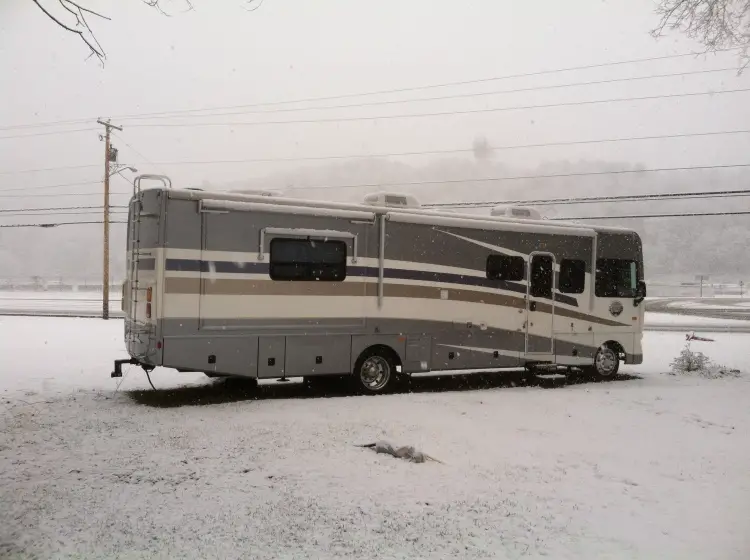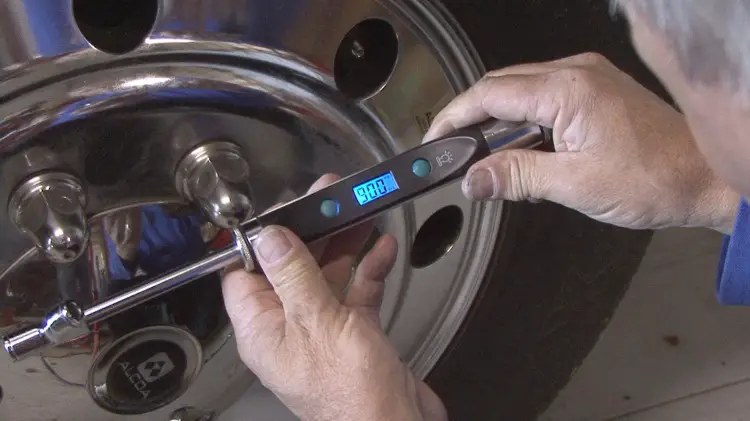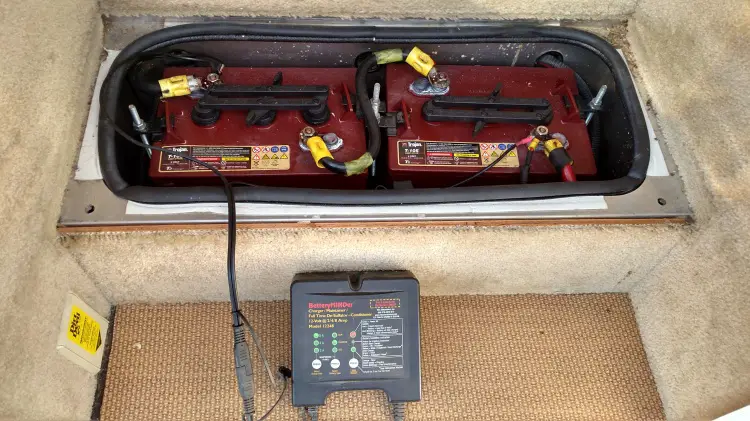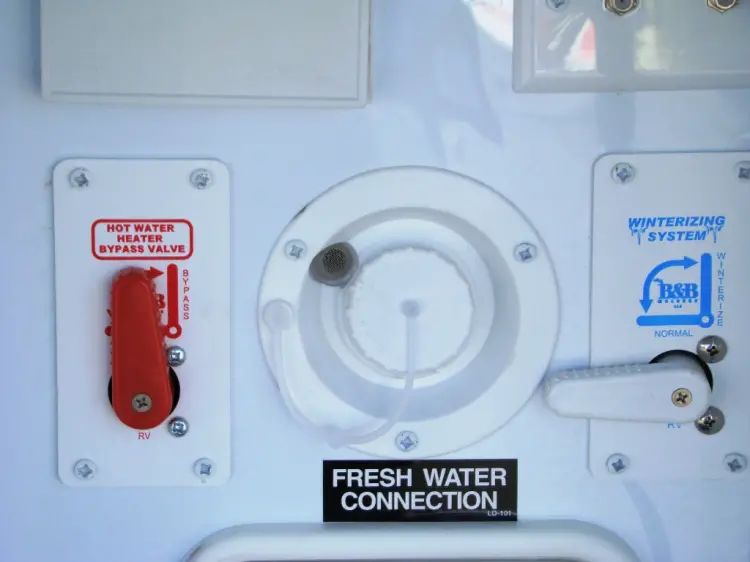
I would like to offer some preventive maintenance checks you can follow to not only help prepare your RV for cold temperatures, but to also help prevent untimely breakdowns as a result of the colder weather.
Here are my top 5 RV Cold Weather Maintenance Tips
1) RV Tire Tips:

During the warmer months of the year I constantly remind folks not to check tire pressure when the tires are hot, meaning after the RV was driven more than one mile. Hot weather and hot tire temperatures cause tire inflation to increase. But something seldom discussed is what happens to your tire pressure when the mercury plummets? The answer is, when it’s cold outside the air pressure in your tires drops 1 to 2% for every 10 degree drop in temperature. This means if you have not checked the tire pressure in your RV tires since that trip you took last summer your tire pressure could be dangerously under-inflated when you head out for the holidays. The best advice I can offer is to get in a habit of checking and adjusting tire pressure monthly, so it is correct regardless of the temperature. This applies to your automobiles as well.
2) Automotive Antifreeze Tips:

When you talk about RVs and antifreeze most folks think about the RV antifreeze used to protect the RV water system from freezing. We will talk about that type of antifreeze in a minute but first I want to talk about the automotive antifreeze used in the RV or tow vehicle engine’s coolant system. Glycol antifreeze does several things to help protect your engine:
1. When it’s cold out it helps lower the freezing point of water.
2. The corrosion inhibitors added to the antifreeze help prevent scale and rust build-up in the cooling system.
3. It provides protection against boiling during the hot summer months.
4. It helps keep the engine operating at its most efficient temperature regardless of operating conditions and outside temperatures.
Just like engine oil, the antifreeze in your RV or tow vehicle’s automotive cooling system needs to be replaced at regular intervals. If you have not had this service performed in the last few years check your vehicle owner’s manual for the recommended intervals and schedule an appointment to have it done.
3) RV Battery Tips:

Batteries are no different than tires and antifreeze when it comes to being affected by weather. In cold temperatures it’s important that both the starting battery and coach batteries remain fully charged. A discharged or partially charged battery will freeze much faster than a charged battery. Batteries in storage will lose a percentage of the charge while they sit idle. It’s not uncommon for a battery to discharge up to 10% a month when it is in storage. Cold temperatures slow this natural discharge process and warmer temperatures speed the process up. You should test the stored battery state of charge every month and charge batteries that are at or below an 80% state-of-charge, or 12.4 volts for a 12-volt battery. If your RV converter charges the battery(s) at a constant rate, around 13.5 volts, this is too high for a float-charge and can deplete the electrolyte over a period of time. In this situation plug the RV in periodically during storage and allow the converter charger to charge the battery(s) for 8 to 12 hours. Some RV converter multi-stage chargers and aftermarket chargers are designed to maintain a float charge on the battery after the batteries are charged and will not deplete the electrolyte. Remember, for the converter charger to operate the RV needs to be plugged into electricity. The other option is to remove the batteries and store them in a cool dry place to prevent them from freezing, but you should still check and recharge batteries that drop below an 80% state of charge.
 Tip: If you remove the batteries take a picture, or draw a diagram of how they are connected to assist with installing them again next spring.
Tip: If you remove the batteries take a picture, or draw a diagram of how they are connected to assist with installing them again next spring.
4) RV Fuel System Tips:

Number four on my list is adding a fuel preservative to the fuel system, especially if you have an on-board generator.
 Tip: This applies to other gas powered engines too, like lawnmowers, weed eaters, and portable generators that tend to sit in storage for months at a time. The fuel that sits in the small needle valves of a carburetor can begin to breakdown and gum up in a very short period of time. The result is the engine may not start, or run properly next spring when you take it out of storage. A fuel preservative can prevent this from happening.
Tip: This applies to other gas powered engines too, like lawnmowers, weed eaters, and portable generators that tend to sit in storage for months at a time. The fuel that sits in the small needle valves of a carburetor can begin to breakdown and gum up in a very short period of time. The result is the engine may not start, or run properly next spring when you take it out of storage. A fuel preservative can prevent this from happening.
Add the recommended amount of fuel preservative to the fuel tank and run the vehicle engine and generator long enough for the preservative to get through the entire fuel system. Another good idea is to change the oil and oil filter on the vehicle engine and the generator prior to storage. Acids accumulate in used engine oil and can corrode engine bearings, especially while sitting for long periods of time. I also recommend starting and running the generator every month for an hour or two with at least a half- rated load on it. Moisture build-up can cause damage to your generator. When you exercise the generator it heats up the generator windings and eliminates this moisture build-up. This monthly exercise regime also lubricates all of the engine seals and components and helps prevent carbon build-up. Consult your generator owner’s manual for generator load ratings.
5) RV Winterizing Tips:

Last but certainly not least is winterizing the RV water system. The RV plumbing system is the most vulnerable system to damage from plummeting temperatures. To protect it from freezing you need to add non-toxic RV/marine antifreeze to all of the water lines in the RV. It’s not that difficult to winterize the water system yourself, or you can schedule an appointment with an RV repair facility. The important thing is to have it done before temperatures drop below freezing.
If you are interested in winterizing the RV yourself we offer a winterizing and storing e-book and video course to show you exactly how it’s done.
There you have it, my top 5 cold weather maintenance tips. If you are not comfortable performing any of these preventive maintenance procedures yourself have the work done by a reputable repair facility. You will be glad you did next spring when the RV is ready for the first camping trip of the new year.
Happy Camping,
Mark Polk
RV Education 101
http://rveducation101.com/
RV 101® Travel Trailer Ultimate Video & E-book Bundle
https://rvonlinetraining.com/p/travel-trailer-ultimate-e-book-and-video-bundle
RV 101® 5th Wheel Ultimate Video & E-book Bundle
https://rvonlinetraining.com/p/rv-101-5th-wheel-ultimate-video-e-book-bundle
RV 101® Motorhome Ultimate Video & E-book Bundle
https://rvonlinetraining.com/p/rv-101-motorhome-ultimate-video-e-book-bundle
Travel Trailer & 5th Wheel Trailer RV Orientation Video Training Course
https://rvonlinetraining.com/p/rv-101-rv-orientation-for-travel-trailer-s-5th-wheel-trailers
Tow Your Travel Trailer Like a Pro Video Training Course
https://rvonlinetraining.com/p/rv-101-trailer-towing-basics
Tow Your 5th Wheel Like a Pro Complete Online Video Training Course
https://rvonlinetraining.com/p/tow-your-5th-wheel-like-a-pro
Motorhome RV Orientation Video Training Course
https://rvonlinetraining.com/p/motorhome-rv-orientation-video-training-course
Drive Your Motorhome Like A Pro Complete Online Video Training Course
https://rvonlinetraining.com/p/drive-your-motorhome-like-a-pro
RV Care & Preventive Maintenance RV DIY® Online Video Training
https://rvonlinetraining.com/p/rv-101-rv-care-preventive-maintenance-online-video-training
RV Essential Items Video Training Course
https://rvonlinetraining.com/p/rv-essential-items
Winterizing and Storing Your RV Video Training Course
https://rvonlinetraining.com/p/winterizing-and-storing-your-rv-video
Travel Trailer 4 Video Bargain Set Plus Free RV Checklist ebook
https://rvonlinetraining.com/p/travel-trailer-video-bundle
5th Wheel 4 Video Bargain Set Plus Free RV Checklist ebook
https://rvonlinetraining.com/p/5th-wheel-video-bundle
Motorhome 4 Video Bargain Set Plus Free RV Checklist ebook
https://rvonlinetraining.com/p/motorhome-video-bundle
———————–
A Collection of RV Education 101 E-Books – 9 RV E-BOOK BUNDLE SET
https://rvonlinetraining.com/p/a-collection-of-rv-education-101-e-books-9-rv-e-book-bundle-set
An Introduction to RVs E-book Training Course
https://rvonlinetraining.com/p/an-introduction-to-rvs
Insider’s Guide to Buying an RV E-Book Training Course
https://rvonlinetraining.com/p/insider-s-guide-to-buying-an-rv-downloadable-pdf-e-book
Owning & Operating an RV E-Book Training Course
https://rvonlinetraining.com/p/owning-operating-an-rv
The Original Checklists for RVers E-Book Training Course
https://rvonlinetraining.com/p/the-original-checklist-s-for-rvers
RV Campground Basics E-Book Training Course
https://rvonlinetraining.com/p/rv-campground-basics-e-book-course
RV Safety Features, Tips & Tricks E-book Training Course
https://rvonlinetraining.com/p/rv-safety-features-tips-tricks
RV Care & Maintenance E-Book Training Course
https://rvonlinetraining.com/p/rv-care-maintenance-e-book-course
Winterizing & Storing Your RV E-Book Training Course
https://rvonlinetraining.com/p/winterizing-storing-your-rv-e-book
RV Battery Care & Maintenance E-Book Training Course
https://rvonlinetraining.com/p/rv-battery-care-maintenance
Trailer Towing Basics E-Book Training Course
https://rvonlinetraining.com/p/trailer-towing-basics-e-book
BRIEF, YET VERY CONCISE. THANK YOU
LikeLike